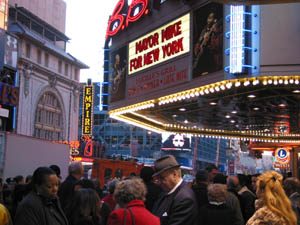By Maurice Pinzon
Mayor Michael R. Bloomberg launched his political campaign for reelection last night with a bash for volunteers at B.B. King’s in Times Square.
With the exception of Herman Badillo, most of the people who were approached in the hall were Democrats who liked the mayor but were not entirely ready to give their wholehearted endorsement ”“ perhaps hedging a bit or uncomfortable endorsing a Republican for mayor.
James E. Caldwell president of the 77th Precinct Community Council in Brooklyn was with his wife, Shirley Cardwell, an enthusiastic supporter of the mayor. But Mr. Cardwell, who said he was a Democrat, would not give a definitive endorsement to the mayor, even as he praised him. Mr. Cardwell said that instead, as a community leader, he wanted to make sure his neighbors were well informed about the mayor’s accomplishments.
When Ms. Cardwell was asked whether she supported the West Side Stadium for the Jets, she said, “Love it.” She added, “We’re all for the Nets.” Ms. Cardwell said the two projects were “good economically.” However, Ms. Cardwell indicated housing was at the top of her list.
Ms. Cardwell was referring to Bruce E. Ratner’s proposed development in Brooklyn that includes a basketball arena for the Nets. Many residents who live near where the proposed arena would be built have vigorously opposed it.
But many of the people interviewed also said the rising prosperity in the city was pricing seniors and low-income New Yorkers out of affordable housing in boroughs such as Brooklyn because people were moving in from more expensive places in Manhattan.
Patricia Scantlebury, who also lives in Brooklyn and was interviewed separately, said that housing was her number one issue. Ms. Scantlebury said the mayor needed to focus on making housing “affordable for people who can’t afford it.” When asked whether the mayor was making any progress, Ms. Scantlebury said the mayor was at least trying.
In a hall with a capacity of only 1,200, support for Mayor Bloomberg appeared to be overflowing. Most people held up signs and shouted “Four more years” and clapped and cheered the mayor.
But a sizable group stood behind the press riser, ignoring the mayor’s comments, while they talked amongst themselves, as they stood by an open bar the campaign had provided.
When Michael Bloomberg did speak he quickly indicated that he did not want people’s money, an unusual statement at a typical early political campaign event. Instead, Mr. Bloomberg said, he wanted the support of people in the room.
Mr. Bloomberg billed himself as a non-politician. He reminded his audience that he had been supported in the previous election because, “you knew that the difficult times ahead required a leader ”“ not a politician.” And he alluded to naysayers as people who were part of a “culture of failure.”
Mr. Bloomberg recited his administration’s accomplishments of low crime rates, education reform, and the revitalization of New York City in the aftermath of September 11.
He pledged to build a campaign army of 50,000 volunteers for his upcoming mayoral reelection campaign.
After Mr. Bloomberg spoke and left the stage, many began to leave even as a line of supporters was outside under the B.B. King marquee on 42nd street.
They stood as if waiting for a show to begin.

